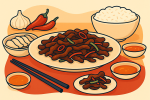Travel to China: Vaccine Requirements and Health Rules
Planning a trip to China? Ensure a healthy and safe journey by understanding essential health precautions. While China has no mandatory vaccination requirements for entry (except Yellow Fever for travelers from at-risk regions), recommended vaccinations like MMR, DTaP, Hepatitis A, and Typhoid can protect you. Learn about important safety measures, disease prevention tips, and how to access medical care in China. Prepare for a worry-free adventure. Read on to discover crucial health advice for your China trip!
Important information

- No mandatory vaccinations are required to enter China, except for Yellow Fever vaccination if arriving from an infected area.
- Routine vaccinations (MMR, DTaP) are recommended, along with Hepatitis A and Typhoid for most travelers. Consider Rabies if you will be near animals.
- Drink bottled or boiled water, consume thoroughly cooked food, and practice frequent handwashing.
- Use insect repellent (containing DEET), bed nets, and protective clothing to avoid mosquito-borne illnesses.
- Secure travel health insurance that includes medical evacuation, and be prepared for potential upfront medical costs.
Understanding Vaccine Requirements for Travel to China
Planning a trip to China? While there are no mandatory vaccinations for entry, staying up-to-date on routine immunizations is essential. These include MMR and DTap vaccines. We also recommend the following vaccinations:
- Hepatitis A,
- Typhoid,
- Covid-19.
Travelers arriving from regions with yellow fever must have the Yellow Fever vaccine. If you anticipate close contact with animals, consider a rabies vaccination. Remember, China’s entry requirements can change, so always verify the latest guidelines before you travel.
What Vaccinations Are Required for Entry?
Traveling to China? Here’s what you need to know about vaccinations: you generally don’t need vaccinations to enter China. However, if you are arriving from a yellow fever-endemic area, you must present a yellow fever vaccination certificate. It’s also recommended to be up-to-date on routine immunizations like MMR and DTaP.Depending on your travel plans within China, your doctor might recommend additional vaccinations. These could include Hepatitis A, Hepatitis B, typhoid, or rabies. For personalized recommendations, consult a travel clinic or your physician four to six weeks before your trip. While a COVID-19 vaccination is recommended, it is not currently mandatory.
Recommended Vaccinations for Extended Stays
Recommended vaccinations for travelers:
- Hepatitis A and typhoid are recommended for most travelers.
- Japanese encephalitis vaccine is recommended if you are going to the outdoors, particularly in rural areas.
- Rabies vaccine is important for those working closely with animals or at increased risk.
- Meningitis vaccination is also available.
- Keep your routine immunizations, such as MMR and Tdap, up to date.
Routine Vaccinations: Are You Up-to-Date?
Planning your trip to China? Start your vaccination preparations four to six weeks in advance. This ensures the vaccines are fully effective and gives you time to consult your doctor or a travel clinic. Discuss necessary vaccinations like MMR and DTaP, which protect against measles, mumps, rubella, diphtheria, tetanus, and pertussis (whooping cough). Make sure all your routine immunizations are up-to-date.
Health Rules and Safety Precautions for Travelers
Stay healthy during your trip to China by following these important tips. Drink bottled or purified water, and eat thoroughly cooked meals from reputable establishments. Wash your hands often, especially after using public transportation. Use insect repellent to protect yourself from bug bites that can transmit diseases. If you’re traveling to mountainous regions, be aware of the risk of altitude sickness.
Before Your Trip
- Stay informed about local health risks, such as avian flu or dengue fever.
- Consult a travel medicine specialist to discuss necessary vaccinations.
- Prepare a travel health kit with essential medications.
Medical Care in China
Healthcare quality in China can vary. Major cities have modern hospitals, but rural areas may have limited medical facilities. English-speaking doctors may not always be available. Be prepared to pay for medical services upfront and ensure your insurance covers international travel and medical evacuation. Register with your embassy upon arrival for added safety.
How to Avoid Contaminated Food and Water
- Drink bottled or boiled water, avoid tap water.
- Eat thoroughly cooked meals and avoid raw or undercooked food, especially from street vendors.
- Wash your hands frequently and use hand sanitizer when soap and water aren’t available.
- Avoid ice unless you are sure it’s made with safe water.
Preventing Bug Bites and Infections
Shield yourself from pesky insects with an effective insect repellent containing DEET. Cover exposed skin by wearing long sleeves and pants. When possible, opt for the comfort of screened or air-conditioned spaces. Minimize outdoor activities during dawn and dusk, when insects are most active. If venturing out is unavoidable, consider clothing and gear treated with permethrin. Use bed nets for a peaceful night’s sleep. Resist the urge to scratch bites, as tempting as it may be. While itching is bothersome, scratching can worsen the irritation. Instead, soothe the itch with hydrocortisone cream.
Use insect repellent with DEET.
Wear long sleeves and pants.
Stay in screened or air-conditioned areas.
Limit outdoor activities during dawn and dusk.
Use permethrin-treated clothing and gear.
Sleep under bed nets.
Avoid scratching bites and apply hydrocortisone cream.
Disease Prevention and Health Risks in China
Planning a trip to China? Be mindful of infectious diseases like Dengue fever, Schistosomiasis, and Malaria. Protecting yourself is easy with a few precautions.
Mosquito-borne Illnesses
Mosquitoes transmit both Dengue and Malaria, so use insect repellent, sleep under mosquito nets, and minimize exposure. This will significantly reduce your risk.
Waterborne Diseases
Schistosomiasis spreads through contaminated water sources. Avoid swimming or wading in these areas to prevent infection.
Food and Water Safety
Safe food and water practices are essential. Opt for bottled water and choose food from reputable sources to minimize the risk of illness.
Altitude Sickness Prevention
If you’re venturing into higher altitudes, ascend gradually to prevent altitude sickness. This allows your body to acclimatize to the change in air pressure.
Pre-trip Consultations
Before embarking on your journey, consult a travel medicine specialist for recommended vaccinations, such as Hepatitis A and Typhoid.
Travel Health Kit
A well-stocked travel health kit with essential medications and first-aid supplies is also a must. Be sure to include any personal prescriptions.
Hygiene Practices
Regular handwashing is crucial for good hygiene. Wash your hands frequently with soap and water, especially before eating.
Stay Informed
Stay informed about current health advisories from organizations like the CDC and WHO. These resources provide up-to-date information on health risks and precautions.
Local Health Resources
Familiarize yourself with local health resources and understand how to access medical care, ensuring a safe and healthy trip.
Risks of Infectious Diseases and How to Prevent Them
Traveling in China presents certain infectious disease risks, so caution is advised. Avoid animal contact, particularly poultry, to minimize your risk of avian influenza. Frequent handwashing is essential for reducing the spread of germs. Here’s how to protect yourself:
- Avoid contact with animals, especially poultry.
- Wash your hands frequently.
- If you develop flu-like symptoms, seek medical attention promptly.
Travel Health Services and Medical Care in China
Compile a list of local hospitals and English-speaking doctors. This will ensure access to quality care in the event of an emergency or unexpected illness.
Secure comprehensive travel health insurance, including medical evacuation coverage. Healthcare standards vary across China, and medical evacuation may be necessary for serious conditions.
Consider supplemental insurance for additional financial security. Many facilities require cash payments, and supplemental coverage can help manage expenses, especially in remote areas.
If you become ill, locate the nearest hospital or clinic and have your travel insurance details readily available. This will help expedite treatment and minimize delays.
In emergencies, contact local emergency services immediately. Time is critical in emergencies, and prompt action can significantly impact outcomes.
Familiarize yourself with the Chinese medical system and clearly communicate your health concerns. This will facilitate better understanding and ensure appropriate care.
Maintain a record of your medical history and medications. This information is vital for healthcare providers to make informed decisions about your treatment.
Upon returning home, inform your doctor about your travels. This can aid in accurate diagnosis of any potential health issues that may arise after your trip.
Finding and Using Travel Health Services
Traveling in China and need medical assistance? Your hotel or embassy can help you find hospitals and English-speaking doctors. It is crucial to ensure your travel insurance covers both medical evacuation and treatment, as many health services require upfront cash payment. Healthcare quality varies across China. Major cities have advanced facilities, while rural areas may lack resources. Having a list of local doctors and hospitals readily available can be invaluable in emergencies.
What to Do If You Get Sick in China
If you experience illness in China, promptly seek medical care, particularly if you have recently been in a malaria-risk zone. In emergencies, dial 120 for an ambulance. For other urgent situations, such as fires, contact 119. Locate nearby hospitals and clinics, and keep your embassy or consulate’s contact information accessible. They can offer crucial support. If you have travel insurance, inform your provider immediately.


















